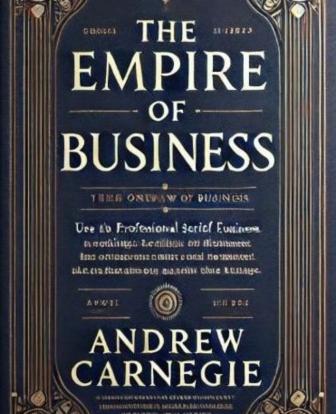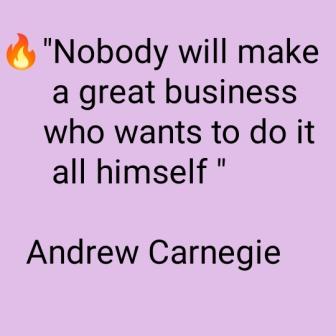The Empire of Business Summary

Don't chase quick profits; instead, focus on scaling your business, reinvesting profits, and dominating your industry.
Why We Recommend this Book
You recommend The Empire of Business because it provides timeless wisdom on building wealth, leadership, and business success from one of history’s greatest industrialists, Andrew Carnegie.
The Empire of Business
The Empire of Business Summary
Ever wondered how one man went from rags to riches and then decided to teach the world his secrets?
The Empire of Business by Andrew Carnegie is like sitting down with a wise, self-made billionaire who’s dishing out all his life hacks.
Carnegie doesn’t just tell you what to do; he shows you how he did it, from mastering the art of making money to building a reputation that people respect and admire. And don’t worry, this isn’t some dry lecture.
Carnegie’s writing is surprisingly relatable, packed with inspiring stories and practical advice that still applies in today’s fast-paced world.
Think of this book as a roadmap to success, whether you’re dreaming of building a business empire, crushing your personal goals, or just figuring out how to make a bigger impact in life.
And here’s the kicker: it’s not just about you. Carnegie believed true success comes when you lift others up along the way.
By the time you finish The Empire of Business summary, you’ll not only feel inspired to chase your dreams, you’ll know how to do it.
So, dive in, soak up the wisdom, and then grab the book for the full experience. Trust us, this one’s worth it!

Click on the Tabs Below to Read The Empire of Business Summary
The Empire of Business by Andrew Carnegie offers invaluable insights into his rise as an industrialist, emphasizing the importance of innovation, ethical leadership, and philanthropy in building a successful business empire and contributing to society.
“The Empire of Business” by Andrew Carnegie is primarily for individuals interested in business, entrepreneurship, and philanthropy. Specifically, it targets:
- Aspiring Entrepreneurs: Those who seek to understand the principles of success in business and learn from the experiences of one of history’s most successful entrepreneurs.
- Business Leaders: Established business leaders looking for insights into effective management strategies, innovation, and ethical business practices.
- Philanthropists: Individuals interested in philanthropy and social responsibility can learn from Carnegie’s philosophy on wealth redistribution and the importance of giving back to the community.
- History Enthusiasts: Readers interested in the history of American industry and the Gilded Age will find “The Empire of Business” to be an engaging and informative read, offering a glimpse into the economic and social dynamics of the era.
Overall, the book appeals to a wide range of readers interested in business, entrepreneurship, leadership, and social impact, making it a valuable resource for anyone seeking inspiration and guidance in their professional or personal endeavours.
PART 1: The road to business success
In this book Andrew Carnegie started by advising young people who want to be successful in life to avoid these 3 things:
- Alcohol: as it will destroy them and not allow them reach their dreams.
- Speculations or gambling: Gambling can make you rich today, but you would never be able to sustain the wealth. Instead of speculating, start a business that is providing solutions to the problems of other human beings. Starting a business may be hard, but it is a sure way to sustainable and enduring wealth. Money gotten from speculations doesn’t last. Most time, the person loses all to gambling.
- Don’t stand as a guarantor for a friend if you are also a debtor to another person. If you are to stand as a guarantor for a loan, never let the amount exceed your own means. Treat the money you are standing as a surety for as a gift and do not stand for an amount you cannot part with.
If you want to be taken serious in your place of work, do all you can attract your employer’s ATTENTION. Prove to your boss that he does not have a mere hireling in his employ.
Instead of being one who is content to give so many hours of work for so many dollars in return, be the one who devotes his spare hours in constant thought to the business – this will make your boss to think of you first when he is thinking of a worthy partner.
Always break orders to save your boss. Do not hesitate to do it whenever you are sure the interests of your employer will be thereby promoted and when you are so sure that the result is such that you are willing to take the responsibility.
You will never be a partner unless you know the business of your department far better than the owners possibly can. These are the kind of men business owners are looking to help their business grow.
People who have the interest of the business at heart and will do all they can including disobeying rules they know are not in the interest of the business to make the business grow.
These are the true bosses. So, boss your boss and do this early enough.
To become a millionaire, you must start early to save most of the money that enters your hand. The money you have saved must them be invested in something that will yield you more money and never to be gambled with.
This habit of putting away money will attract business men (who are willing to go into partnership) to you. They will trust and want to partner with you because you have developed discipline which is a great habit for creating wealth.
When you start a business, concentrate all your efforts and resources in the business. Don’t scatter your resources in several businesses at a time. Put all your eggs in one basket and watch the basket closely.
PART 2: The ABC of Money
Money as we know it today are just worthless papers and do not reflect the value of what the government institutions printed on them and would like you to believe.
A medium of exchange is supposed to be equivalent to the value it is to be exchanged with in value, but this is no longer so.
The government institutions print notes and make us believe that those notes are of the same value as what is printed on them.
The governments are shortchanging their citizens with the instrument of money.
PART 3: Interest of Labour and Capital
Employers should embark on corporate responsibility to maintain to some extent the old feeling of kindliness, mutual confidence, respect and esteem which formerly distinguished the relations between the employer and his men.
Wages of employees should be based upon a sliding scale, in proportion to the net profit received for product month by month. This way employees would not be seeking to make more money when the business is not doing so well and when the business is doing well, everybody gets paid well.
This can be achieved by making your business’ financial statements available to employees.
This way, the employees and the employers work as partners working towards the growth of the business as they know when a business is doing well and when a business is doing badly.
An employee that knows that the growth of the business is equal to more money for her will work hard to ensure the business grows.
Make reading a habit and focus on specializing on an area which gives you support; know that thoroughly and well, to be an expert in your area of specialty. If you are a mechanic, then study every work about the subject of mechanics.
Seek to be among the world first 10 people in your area of work.
Don’t let anyone know more of your specialty than you. Then read widely, seek to know little about every other thing. “Just as on his farm the farmer must first attend well to his potatoes and his corn and his wheat, from which he derives his revenue, and he may spend his spare hours as a labour of love in cultivating the flowers that surround his home.”
Becoming a specialist in the work that brings you revenue is your number one priority, while acquiring general knowledge in other areas is your recreation and also important.
This is how an employee moves from the level of a worker to the partner of the employer.
Learn everything you can about the fundamental laws of demand and supply, the law of competition
Know when to take a break and find amusement. Engage in sports or other games as it is a great mistake to think that the man who works all the time wins in the race. Become interested in baseball or cricket, or horses, anything that will give you innocent enjoyment and relieve you from the usual strain.
You are not to consume every earning that you make. You must consistently save a part of all money you earn to be used for the purpose of investment in building capital projects that will give you more returns. This is the difference between the rich (civilized) and the poor (savage). One saves a part of his earnings for the purpose of investment while the other consumes everything earned.
“Each man, by thrift, saves a little, puts the money in a bank, and the bank lends it to the shipbuilders, who pay interest for the use of it.”
The amount you should save per earning does not need to be great, just ensure you are saving something for future investments or projects whenever you earn money.
Keep money in the position of a useful servant. Hoarding millions is not thrift. It should be used to make the world a better place. Always seek to leave the world better than you found it.
PART 4 How to win fortune
“The millionaires who are in active control started as poor boys, and were trained in that sternest but most efficient of all schools—poverty.“ Most of these people did not go to the regular schools, but where instead hotly engaged in the school of experience (started actively working from age 14-20), obtaining the very knowledge required for future triumphs in business.
Andrew Carnegie saw college as a waste of time as it does not confer on the student the required skill and experience necessary for running a business.
The graduates who enter the world of work at the age of 20 mostly fit the position of workers who are compensated with salary and do not stand a chance to compete with the people who have been working and gathering business experience since the age of 14.
Education is good, but the education that should be valued is only the one that leads a man to the road that will bring him the desired fortune.
Businesses of vast concerns cannot be successfully conducted by salaried employees. No great business of any kind can score an unusually brilliant and permanent success which is not in the hands of practical men particularly interested in its results as against men who are just interested in receiving salaries.
When, therefore, the young man, in any position or in any business, explains and complains that he has not opportunity to prove his ability and to rise to partnership, the old answer suffices “The fault, dear Brutus, is not in our stars, but in ourselves, that we are underlings.
PART 5: Wealth and its uses
Andrew Carnegie is of the opinion that poverty is a stimulating school that takes ordinary people from the ground to greatness. He believes that being born poor is one of the greatest things that can happen to anyone unlike being born with a silver spoon.
“We can scarcely read one among the few “immortal names that were not born to die, ” or who has rendered exceptional service to our race, who had not the advantage of being cradled, nursed, and reared in the stimulating school of poverty.”
He admonishes people who have amassed fortune not to make their children victim of their wealth by over pampering them. They should instead make them go out and create their own wealth and not depend on their parent’s wealth.
Anyone who was born poor is regarded by Andrew Carnegie as fortunate. All he needs to do is to find wealth is to first ask himself “what shall I learn to do for the community which will bring me in exchange enough wealth to feed, clothe, lodge, and keep me independent of charitable aid from others?”
Then the next thing he is to do once he starts earning from his choice of means of income, is to start saving a portion of all his earnings to be invested in securities, properties or business.
You do not need to put together so much money before you can start investing. Save from your earnings, invest them and watch it gradually grow and make you rich. If you are able to save as little as $50 or $100, you can start a business or start investing in stocks (own a part of a big business), real estate etc.
So, you don’t need to have up to a million to start. Anyone can start growing money. All you need is that first $50 or $100.
Don’t invest your savings in any business or stock you don’t understand. This is the one of the reasons most businesses fail.
And when you have accumulated so much wealth, distribute for the good of humanity to make the life of others better while you are still alive by building institutions or creating innovative developments that will last for generations.
Andrew Carnegie describes any rich person who was not able to distribute his/her wealth for the good and the advancement of humanity while alive as a sad failure.
PART 6: The Bugaboo of Trusts
All industries should hold firmly the doctrine of free competition and keep the field open for all who are interested. There should be freedom for all to engage in manufacturing or any business as long as the person has the capital to invest in the same condition open to all.
Any attempt to maintain a monopoly in any branch/industry will likely end in failure for there can be no permanent extortion of profit beyond the average return from capital.
Monopoly in the form of TRUST strangles the growth of an industry while healthy competition helps it to grow and benefit the public.
PART 7: Anglo-American Trade Relations
The principle of free trade should be allowed by nations as the world respects a nation that can supply it with its needs.
This principle of free trade does not respect flags; it respects best bargain as nations buy from and sell to countries from which they obtain great bargains. Political acquisition is not essential for acquiring the trade of new territory.
PART 8: Business
Focus on one kind of business and master it. Don’t jump from business to business. Concentrate all your efforts and resources in one for no one can master two businesses. You will end up spreading yourself too thin and lose both businesses.
The difference between a business person and a worker is that the first depends on profit while the second depends on a fixed salary. The business person bears all the risks and makes more money while the worker bears no risk and earns so little, but we must all start from somewhere. You can start as workers but never stop there.
While working for your boss, do not work for salary alone. Do all you can to help grow the business of your employer; go the extra mile. And when he is looking for a partner, you will be the first person that comes to mind. This will be your beginning of owning part of the business.
Here is a secret to business success: conduct your business with just a little more ability than the average man in your line. If you are only above the average, your success is secured, and the degree of success is in ratio to the greater degree of ability and attention which you give above the average.
There are always a few in business who stand near the top, but, there are always an infinitely greater number at and near the bottom. And should you fail to ascend, the fault is not in your stars, but in yourselves.
Anyone who intends to acquire a degree should ensure that as he/she is getting the degree gets business skills too in the area he intends to focus on. A graduate who also has business knowledge is far better than a person who never got a degree but acquired only business skills.
A business creates value and benefits the community by improving their lives, while speculation does not provide any value and supplies no want.
PART 9: The three legged stool of business
Capital, labour and business ability are the three legs upon which any business stands. Without any of these three, the stool of a business collapses for a business cannot succeed without any of these three and the stool becomes of no use until the 3rd leg is restored.
None of the three legs is more important than the other. The three are equal partners of a grand role.
Based on the teachings of “The Empire of Business” by Andrew Carnegie, here are some recommended action points that you need to start implementing immediately:
- Set Clear Goals: Define your long-term goals and create a clear vision for success in your chosen field or industry.
- Invest in Education: Continuously seek opportunities to learn and improve your skills. Invest in education and personal development to stay competitive in the rapidly changing business landscape.
- Embrace Innovation**: Embrace innovation and technological advancements in your industry. Stay ahead of the curve by adopting new tools, technologies, and strategies to enhance your business operations.
- Build Strong Team: Recognize the importance of teamwork and collaboration in achieving success. Surround yourself with talented individuals who share your vision and complement your skills.
- Practice Ethical Leadership: Lead with integrity and ethical conduct. Build trust and credibility with your employees, customers, and stakeholders by demonstrating honesty, transparency, and fairness in your actions.
- Diversify Investments: While focusing on your core business, consider diversifying your investments to mitigate risks and seize new opportunities for growth.
- Give Back to Society: Recognize the importance of giving back to the community. Allocate resources for philanthropic initiatives that address pressing social issues and contribute to the greater good.
- Monitor Finances Closely: Keep a close eye on your finances and investments. Regularly review your financial statements and performance metrics to identify areas for improvement and make informed decisions.
- Stay Committed to Success: Stay committed to your goals and persevere in the face of challenges. Embrace failure as a learning opportunity and remain resilient in your pursuit of success.
- Focus on Efficiency: Prioritize efficiency in your work and business operations. Identify areas where you can streamline processes and eliminate waste to maximize productivity.
Here are some steps to prioritize efficiency in your business:
Prioritizing efficiency involves identifying and focusing on tasks, processes, or strategies that yield the highest returns in terms of output, productivity, and resource utilization.
- Identify Goals and Objectives: Clearly define your goals and objectives, both short-term and long-term. Understand what you want to achieve and what outcomes are most important to you or your organization.
- Analyze Tasks and Processes: Assess your current tasks, workflows, and processes to identify areas where improvements can be made. Look for tasks that are time-consuming, repetitive, or inefficient.
- Use Prioritization Techniques: Use prioritization techniques such as the Eisenhower Matrix, ABC prioritization, or Pareto Principle (80/20 rule) to categorize tasks based on their importance and urgency. Focus on high-priority tasks that align with your goals and provide the most significant impact.
- Delegate and Automate: Delegate tasks that can be done more efficiently by others, freeing up your time to focus on higher-value activities. Additionally, automate repetitive tasks using technology or tools to save time and reduce errors.
- Time Management: Manage your time effectively by setting deadlines, breaking tasks into smaller, manageable chunks, and allocating time blocks for specific activities. Avoid multitasking, as it can decrease productivity and efficiency.
- Continuous Improvement: Foster a culture of continuous improvement by regularly reviewing and optimizing your processes. Encourage feedback from team members and stakeholders to identify areas for enhancement and implement changes accordingly.
- Eliminate Waste: Identify and eliminate any unnecessary steps, resources, or activities that do not add value to your goals. Streamline workflows and reduce inefficiencies to maximize productivity and minimize waste.
- Utilize Resources Wisely: Make efficient use of available resources, including time, money, and manpower. Allocate resources strategically to tasks and projects that offer the greatest return on investment.
- Stay Flexible and Adaptive**: Remain flexible and adaptive in your approach to efficiency. Be open to trying new methods, technologies, or strategies that may improve your processes and outcomes.
- Measure and Track Progress: Monitor and measure your progress towards efficiency goals using key performance indicators (KPIs) and metrics. Track improvements over time and adjust your strategies as needed to maintain efficiency.
By implementing these action points, you are applying the valuable lessons from “The Empire of Business” to your life and business, fostering growth, success, and positive impact in their endeavors.

Andrew Carnegie, born on November 25, 1835, in Dunfermline, Scotland, was a prominent industrialist, philanthropist, and author.
His family immigrated to the United States in 1848, settling in Pittsburgh, Pennsylvania, where Carnegie began his journey in the steel industry.
Despite receiving only a basic education, Carnegie’s keen intellect and entrepreneurial spirit propelled him to success.He started his career as a telegraph messenger boy, where he gained valuable insights into the burgeoning telecommunication industry.
Later, he became a telegraph operator, learning about business practices and investment opportunities.
Carnegie’s big break came when he recognized the potential of the steel industry during the American Civil War. He invested in steel companies and eventually founded his own, Carnegie Steel Company, which became one of the largest and most profitable steel producers in the world.
Throughout his career, Carnegie implemented innovative practices such as vertical integration and cost-cutting measures, revolutionizing the steel manufacturing process.
His company played a pivotal role in fuelling America’s industrial growth, supplying steel for railroads, bridges, and skyscrapers.
Despite his immense wealth, Carnegie believed in using his fortune for the greater good. He became one of the most generous philanthropists of his time, donating millions to various causes, including education, libraries, and world peace initiatives.
His most famous philanthropic endeavour was the establishment of over 2,500 public libraries, known as Carnegie Libraries, around the world.
Andrew Carnegie died on August 11, 1919, in Lenox, Massachusetts, leaving behind a lasting legacy as both a titan of industry and a champion of philanthropy. His collection of business notes, The Empire of Business, provides valuable insights into his experiences, business strategies, and principles that shaped his remarkable career.
“The Empire of Business” by Andrew Carnegie is a seminal work that offers readers a firsthand account of Carnegie’s experiences and insights into the world of business and industry during the late 19th and early 20th centuries.
Published in 1902, the book provides a comprehensive overview of Carnegie’s rise to prominence as a leading figure in the steel industry and his philosophy on wealth accumulation and philanthropy.
In “The Empire of Business,” Carnegie reflects on his journey from humble beginnings as a Scottish immigrant to becoming one of the wealthiest and most influential individuals of his time.
He shares anecdotes, strategies, and lessons learned from his years of entrepreneurship, offering valuable advice to aspiring business leaders.
Throughout the book, Carnegie emphasizes the importance of innovation, perseverance, and ethical conduct in achieving success in business.
He discusses the principles of efficiency, productivity, and teamwork that guided his management approach at Carnegie Steel Company, showcasing how these strategies helped him build a vast business empire.
Moreover, “The Empire of Business” delves into Carnegie’s views on the responsibilities of the wealthy and the role of philanthropy in society.
He advocates for the redistribution of wealth through charitable giving and argues that the rich have a moral obligation to use their resources for the betterment of humanity.
Overall, “The Empire of Business” serves as both a memoir of Carnegie’s remarkable career and a timeless resource for understanding the principles of business success and philanthropy.
It continues to inspire and educate readers interested in entrepreneurship, leadership, and social responsibility.

